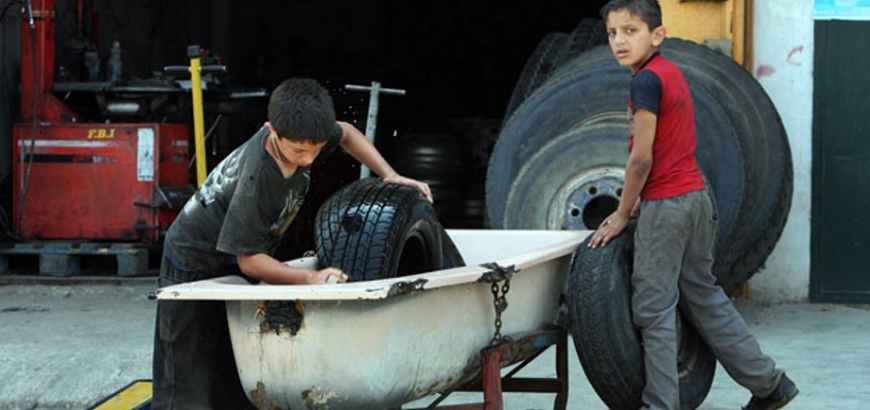The dire conditions facing displaced Syrians in Lebanon and a lack of aid has placed them before difficult challenges, with the lack of humanitarian aid leading to widespread child labor.
Incidents of child labor among Syrian refugees in Lebanon is a serious concern for Syrian society, according to a previous warning issued by the United Nations, as thousands of children are forced into work without access to an education, threatening the loss of an entire generation.
Seventy-one percent of Syrians who have been displaced to Lebanon live below the poverty line, according to U.N. statistics published in January 2017. With most required to rely primarily on inadequate humanitarian aid, many families with small children have been forced to put them to work.
One child, Mohamad Aisawi, who works at a supermarket in Beirut, was like others prevented from access to an education. He told Alsouria Net that he was outstanding at school but that he was forced to work 12 hours a day in order to help his family pay rent, which amounted to $500 a month.
Omar al-Mahmoud, 10, faces major difficulties in reconciling his work and school time. Despite having been a standout student, he is not able to complete his homework as well as working in a cafe for about eight to 12 hours hours a day.
Alsouria Net observed many cases of child labor in Lebanon, especially in the Bekaa region, the main environment for Syrian child labor.
Reasons leading to children to go to work
Speaking to Alsouria, head of educational at the Multi-Aid Programs (MAPs) organization Mohamad al-Masri explained that a number of reasons contribute to the high rates of child labor in Lebanon.
1. The lack of a breadwinner. Thousands of Syrian families have lost those who provided for them materially, either through death or because they are not in Lebanon.
2. The breadwinner is not able to work. Lebanese law prohibits Syrians in the camps from working, which makes the child a sanctuary for earning a living.
3. Inability of most Syrians outside the camps to work. Lebanese laws and the difficulty of obtaining work permits prevents many refugees from access to work.
Double defeat
Many Syrian children in Lebanon are being deprived of educational opportunities because of the lack of legal residency, while many other children have left schools because they are unable to pay for transport, according to Masri.
Mohamad al-Hassan (not a real name), an activist who works with refugees in the Bekaa region, said: “Usually the work which children perform is exhausting and physically demanding and is not compatible with a child’s weaker body. There are those who carry and transport goods and others who repair cars and machines, which has pushed international groups concerned with children’s affairs to raise a loud voice warning about the consequences of child labor and its effect on children’s physical and psychological health, and its major effect in terms of education, as many of these children are forced to leave school to be able to support their families.”
According to UNICEF, around 187,000 children, which accounts for roughly half the school-age Syrian children in Lebanon, are not attending classes.
Meanwhile, older children are denied a secondary education in part due to the restrictions imposed on who can sit for secondary tests due to difficult conditions imposed on Syrians, including language and identity documents, and partly due to children leaving school to join the workforce or marry, the Carnegie Center for the Middle East reported.
This article was translated and edited by The Syrian Observer. Responsibility for the information and views set out in this article lies entirely with the author.


